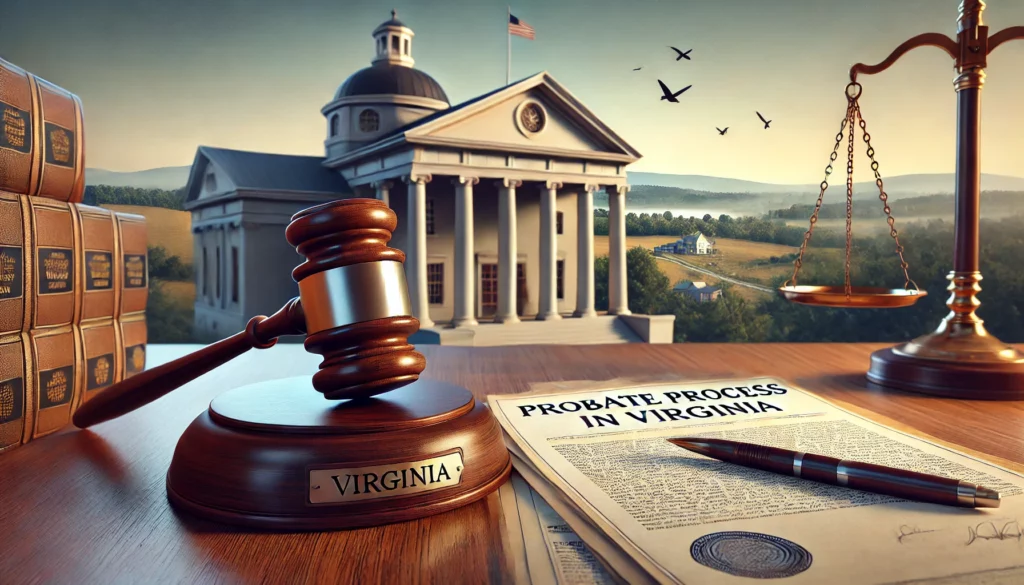What Is the Probate Process in Virginia?

Introduction
If you’ve found yourself searching for “What Is the Probate Process in Virginia?”, you’re likely facing a challenging time—possibly dealing with the death of a loved one and trying to navigate the often overwhelming legal process that follows. You might be trying to understand what probate is, how it works in Virginia, and what steps you need to take to handle the estate left behind. Perhaps you’re concerned about the costs involved, how long it will take, or whether you’re required to sell the house during probate. These are all valid concerns, and you want clarity. At this point, you’re probably also trying to determine the best course of action, especially if you need to sell the property quickly or if the estate has complicated issues, like debts or disputes. You’re wondering whether selling the property to a cash buyer might be an easier option.
This blog will provide you with the essential information you need about the probate process in Virginia, break down the steps involved, highlight the potential costs, and discuss alternatives like selling the house for cash. By the end of this blog, you will have a clearer understanding of whether dealing with probate is the best route or if selling the property to a cash buyer could save you time, money, and stress. If you find yourself looking for quicker solutions, we’ll also explore how working with us can simplify this process.
What is the Probate Process in Virginia?
The probate process in Virginia refers to the legal procedure through which a deceased person’s will is validated, their debts are settled, and the remaining assets are distributed to heirs. If the decedent didn’t have a will, the court will appoint an administrator to handle the estate. For many, navigating this process can feel overwhelming, especially when it involves valuable property or emotional considerations like family dynamics. Understanding the probate process is crucial because it affects everything from how assets are managed to how quickly you can access the home or other estate properties.
The first key point to understand is that probate in Virginia can take several months, even up to a year or more, depending on the complexity of the estate. Probate involves a series of legal steps and typically includes verifying the will, notifying creditors, paying debts, and transferring property ownership. For a family member or heir, this can feel like an exhausting process, especially if the estate includes property that needs to be managed or sold.
Key Steps in the Probate Process in Virginia
Understanding the key steps in the probate process will help you know what to expect. Here’s a breakdown of the stages involved:
- Filing the Will and Petitioning for Probate
The probate process in Virginia begins by filing the decedent’s will with the local circuit court. If the deceased person left behind a will, it will be submitted to the court, and the named executor (or administrator if there is no will) will petition the court to begin probate. This is one of the first responsibilities for those named in the will, and it marks the official start of the probate process.
If there’s no will, the court will appoint an administrator to manage the estate. The court reviews the petition and confirms the validity of the will, which could take time if there are complications or disputes over its authenticity. You can learn more about this step on the Virginia Judicial System’s probate page. - Notifying Heirs and Creditors
After the petition is filed, the next step is to notify all heirs, beneficiaries, and creditors. This typically involves placing a public notice in a local newspaper. Creditors then have a specified period (usually four months) to file claims against the estate. If the estate has sufficient assets, the debts are settled before the property is distributed.
For more information on creditor claims during probate, you can check out this resource on creditor claims in probate.
- Inventorying and Appraising the Estate
Once the debts are accounted for, the next task is to gather, inventory, and appraise all assets of the estate, which may include bank accounts, real estate, and personal property. For real estate, this means determining the property’s current market value. - Paying Debts and Taxes
Any outstanding debts, such as mortgage payments or property taxes, must be settled before distributing assets. This can also include estate taxes depending on the value of the estate. Debts take precedence over distributing the property to beneficiaries. - Distributing the Remaining Property
After all debts are paid, and any applicable taxes are settled, the remaining assets (including real estate) can be distributed to the heirs according to the terms of the will or Virginia’s laws of intestacy (if there’s no will).
The Costs of the Probate Process in Virginia
The costs of probate in Virginia can vary depending on the size and complexity of the estate. On average, probate fees can range from 3% to 7% of the estate’s value. For a $500,000 estate, this could mean between $15,000 and $35,000 in legal fees, court costs, and administrative fees.
Additionally, keep in mind the ongoing costs involved in maintaining the estate during the probate process. For example, if there is real estate involved, you may need to continue paying property taxes, insurance, and utilities while probate is in process. These costs can add up, especially if probate stretches out for several months or more. Furthermore, if there are debts to pay, the estate may be required to sell assets to settle them, which could include selling real estate.
The costs of maintaining and insuring the property can become burdensome, especially if the house is left vacant and deteriorates over time. This is one reason why many people involved in probate consider selling the property as a way to liquidate assets and reduce costs. If you are wondering about selling a house in probate, check out our page on Can You Sell a House in Probate? for a clearer picture of how the process works.
The Duration of the Probate Process in Virginia
How long does probate take in Virginia? The answer is that it depends on the estate, but on average, it takes 6 to 9 months. However, it can be much longer, especially if there are complications, such as disputes over the will, a large number of creditors, or a property that needs to be sold. The key point to remember is that probate is rarely quick.
During this time, you may find yourself with limited access to the estate’s assets, including real estate. For example, if you’re trying to sell a house during probate, the probate process must be completed before the property can be officially transferred to the heirs. This can create delays, especially if the house needs significant repairs or if there are outstanding mortgages or liens against the property.
For those in urgent need of selling, the probate process can be a bottleneck, preventing timely action.
For more details about the probate timeline and how it affects the sale of real estate, visit our page on What Is the Probate Process?.
Can You Sell a House in Probate in Virginia?
A common question from those involved in the probate process is whether it’s possible to sell a house during probate in Virginia. The answer is yes, but with certain conditions. If the house is part of the estate, it cannot be sold until the probate court gives approval, unless the executor or personal representative has been granted special permission.
Typically, the house must be sold to pay off estate debts or taxes. However, the probate process doesn’t prevent heirs or the executor from selling the house if the estate requires it or if the house is not wanted by the heirs.
This is where selling to a cash buyer can provide a significant benefit. If you’re looking for a fast and hassle-free sale, selling the house for cash can simplify the probate process by providing a quick closing. In addition to avoiding the traditional sale process, selling for cash eliminates the need for costly repairs, appraisals, and inspections.
The Risks and Benefits of Selling a House During Probate
Selling a house during probate in Virginia offers both benefits and risks. The main benefit is that it allows the estate to liquidate assets quickly and pay off debts, potentially speeding up the probate process. Additionally, if there are multiple heirs, selling the house can divide the proceeds more easily.
However, there are risks to consider. Selling a house during probate can be time-consuming and costly if the court requires additional approvals or if there are complications. Furthermore, the property may be tied up in legal disputes or might need significant repairs, which could decrease its market value.
The biggest risk, however, is the possibility of inheriting debt or losing the property to foreclosure if it’s not handled properly. If the estate is insolvent (i.e., it has more debts than assets), the property may need to be sold off at a loss or even auctioned off.
Conclusion: Why Selling to Local Home Buyer May Be Your Best Option
The probate process in Virginia can be a time-consuming, expensive, and complicated procedure, particularly when real estate is involved. From legal fees and maintenance costs to long delays and property disputes, managing a probate property can quickly become overwhelming. If you need to sell the property quickly or want to avoid the hassle of repairs, inspections, and appraisals, selling to Local Home Buyer may be your best option.
By working with Local Home Buyer, you can bypass many of the complications that come with the probate process. We offer a fast, straightforward cash sale, allowing you to sell the house quickly and with minimal stress. This approach can help you liquidate the property, settle estate debts, and move forward without the long wait or additional costs typically associated with probate.
At Local Home Buyer, we understand how complicated probate can be, and we’re here to help make the process easier for you. Contact us today to see how we can assist you in selling your probate property quickly and efficiently.
